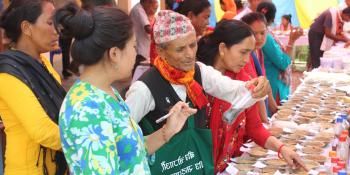Scenario-guided policy development in Uganda in the context of climate change
A workshop developing an implementation plan for the National Agriculture Policy and a revision of the Mechanization Framework through future socio-economic scenarios to take place on 19-20 February in Uganda.
The Policy Action for Climate Change Adaptation (PACCA) project aims at informing and linking policies and institutions for the development and adoption of climate-resilient food systems in Uganda and Tanzania.
The PACCA project is an initiative of the CGIAR Research Program on Climate Change, Agriculture and Food Security (CCAFS) Flagship on 'Policies and Institutions for Climate-Resilient Food Systems', and focuses on interdisciplinary science-based recommendations to inform policy implementation and that encourage adoption of climate-smart agricultural practices across multiple scales.
Policy actions will be implemented by:
- The creation of a Learning Alliance, a national level platform that will serve as a focal platform for the implementation of policy engagement actions and will develop a policy engagement strategy.
- Engagement with National Climate Change Units (CCU) to encourage dialogue with (local) policy makers and implementers on climate change issues.
As a part of this project, a workshop is organized focusing on the development of an implementation plan for the National Agriculture Policy and a revision of the Mechanization Framework.
The process aims to examine these plans in terms of multiple socio-economic and climate scenarios, a project under CCAFS FP4 and University of Oxford Environmental Change Institute (ECI), as well as current PACCA research, to improve the policy’s robustness, flexibility and feasibility in the face of these diverse futures.
During a workshop, taking place in Jinja in Uganda 19-20 February, the National Agriculture Policy and the Mechanization Framework will be analysed and evaluated by the workshop participants to create first drafts (an implementation plan for the NAP and a revised version of the MF summary) that include the participants’ key concerns, and focus on links across levels.
Then, the CCAFS East Africa scenarios will be downscaled to the relevant policy levels (national to local). The scenarios will also be used to interpret the future consequences of current PACCA research results. These scenarios will then be used to test the feasibility of the new draft and provide suggestions for improvement. This will result in a final draft that is expected to be feasible in the context of diverse socio-economic/climate futures.


